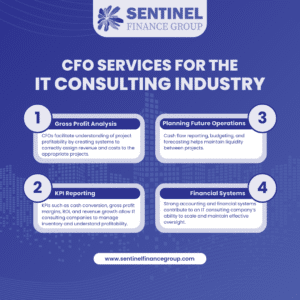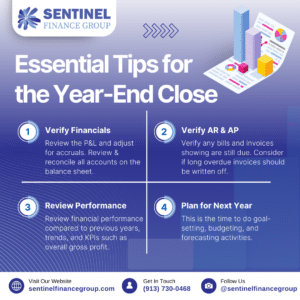Small businesses often have a controller as their senior financial role, and owners often wonder at what point a CFO is needed. In general, a small business can run effectively with only a controller until they want to scale processes, production, and operations. A CFO is needed to create the financial processes and strategy necessary to achieve significant financial growth.
A CFO (also sometimes called a finance director) is the leader of the finance team, and is one of the leaders of the company as a whole. The CFO is in charge of a company’s resource allocation, raising capital, maintaining relationships with investors and the board, reporting to the board, and communicating closely with the CEO and controller. A CFO also analyzes a company’s financial risk related to trends in gross profit, liquidity, debt ratios, etc.
A CFO is also the leader of the accounting team. The CFO sets up the finance department’s systems and processes correctly so everyone in the financial department can do their job effectively. The CFO ensures the correct programs, financial reviews, checks and balances, and reporting procedures are in place, which will ensure the financial data is accurate and everything is running efficiently.
An accounting controller (also sometimes called an accounting manager) is the senior accountant on the team and is responsible for the accuracy of and giving an explanation for the numbers at the end of each month. It’s important to note that a controller at a large corporation has a slightly different role, for example to keep a specific division’s cost within budget.
Essentially, the CFO is in charge of creating all the systems, procedures, and structure of the financial department, while the controller executes those procedures and systems.
The controller reviews the previous month and creates financial reports with KPIs. The CFO takes those numbers and draws meaning from them, in order to make decisions to meet the company’s future goals. The CFO considers the financial vision and whether the company is on a path to get there. The CFO asks whether previous months trend with the company forecast and goals. If not, the CFO drills down into why and creates the plan to achieve the goals moving forward.
Sentinel Finance Group creates financial processes and systems to enable our clients to scale. We create systems for accounting, cash flow management, revenue growth, and forecasting. We ensure all the financial procedures are set up correctly so the data is accurate, and we help our clients make meaningful decisions from the information and trends. We listen to our clients’ visions and create a financial plan with measurable parameters to ensure they achieve their goals.
Sentinel Finance Group is a fractional CFO firm in Kansas City and provides outsourced CFO services and controller services to local businesses.




